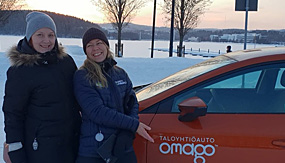
© City of Jyväskylä
Since the beginning of this year, biogas-powered shared cars have been available for trial use in Kangas, Jyväskylä. Over the course of the spring, ‘car mentors’ will also be teaching other interested people about car sharing. Car sharing is already being taken into consideration in the zoning of new residential areas.
‘Car sharing fits well in the resource wisdom ideology of the Kangas area,’ says Smart Mobility Coordinator Kati Kankainen from the City of Jyväskylä. ‘Privately owned vehicles stand idle some 90 per cent of the time. Car sharing enables more efficient utilisation of resources and, at best, makes it possible to give up one’s personal vehicle.’
Powered by local biogas
The two shared cars in Kangas are powered by biogas. The cars also have a gas tank, which means that they are bi-fuel vehicles. Biogas is included in the price of using the cars, but users must pay a separate fee if they want to use gas. The cars can be easily refuelled with biogas at Mustankorkea’s biogas station that will soon open in Seppälä, near Kangas.
‘The cars can be rented by anyone interested, both local residents and companies. In practice, an individual customer or organisation registers as a user online and books a time for using the car. Payments are also made online. The car doors are opened and locked with a mobile phone,’ Kankainen explains.
Most of the reservations made are for one or two hours, but a car can also be booked for a longer period of time. In practice, the pricing is pushing users towards shorter usage times.
Car sharing is considered in community planning
The city can promote car sharing opportunities with land use planning. In Jyväskylä, car sharing is linked to complementary construction in the city centre in cooperation with the property developer.
‘Car sharing supports the perspective of sustainable mobility, but it is important that it does not conflict with public transport, cycling and walking. In some cases there is a risk that stationless shared cars would be a tempting replacement for cycling and public transport. The fact that the cars must always be returned to their home station at a garage in Kangas reduces their unnecessary use,’ Kankainen says.
Kangas is a car sharing pilot site in Jyväskylä, and it is hoped that car sharing services will also spread to other areas. Over the course of the spring, residents of Kangas who want to introduce others to car sharing through social media and local events, for example, will be trained as ‘car mentors’. Additionally, a survey will be carried out over the course of the year to map user experiences of car sharing.
More information:
Kati Kankainen, Smart Mobility Coordinator, City of Jyväskylä
firstname.lastname@jkl.fi